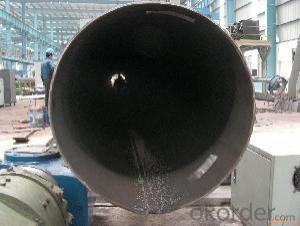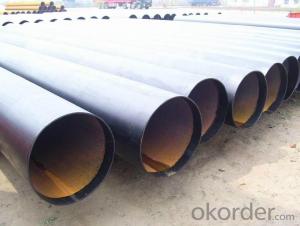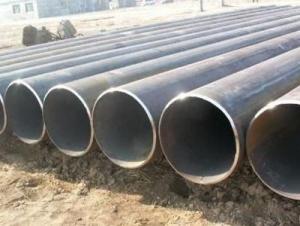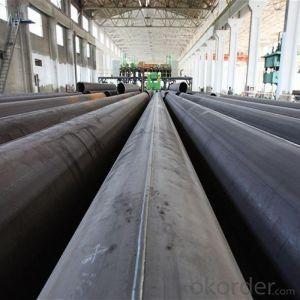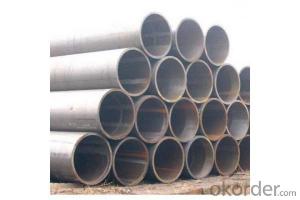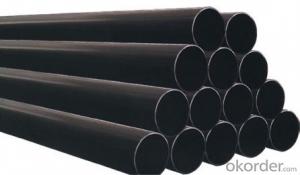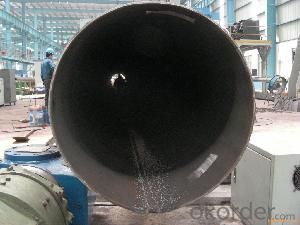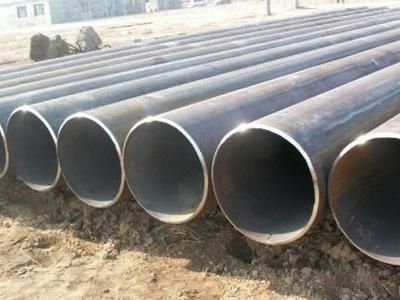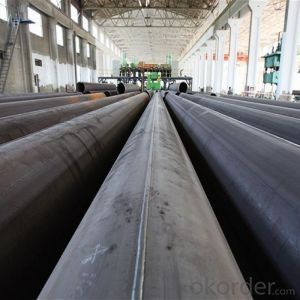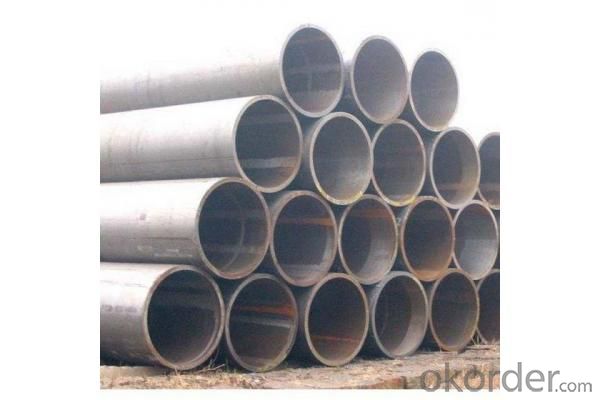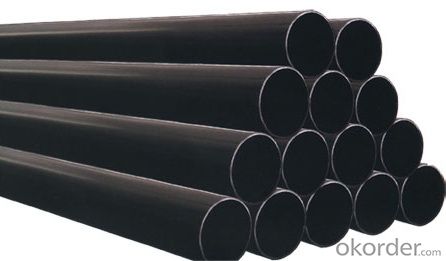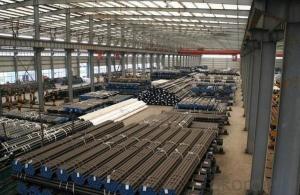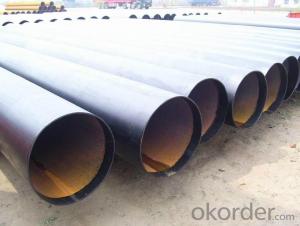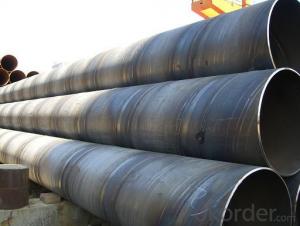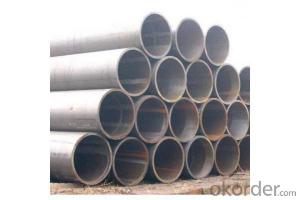API SSAW LSAW CARBON STEEL PIPE LINE OIL GAS PIPE 10''
- Loading Port:
- Tianjin
- Payment Terms:
- TT OR LC
- Min Order Qty:
- 1 m.t.
- Supply Capability:
- 3000 m.t./month
OKorder Service Pledge
OKorder Financial Service
You Might Also Like
Packaging & Delivery
Packaging Detail: | standard export packing or as customer's requirement |
Delivery Detail: | within 10 - 30 days |
Specifications
Spiral Welded Steel Pipes and Tubes
1.Material:Q195-Q235
2.Length:1-12m
3.WT:1.0-14mm
4.O.D.:20-273mm
Spiral Welded Steel Pipes and Tubes
Product Description:
1.Material : Q235,Q345,L245,L290,L360,L415,L450,L485,GrB,X42,46,X52,X56,X60,X65,X70,X80,X100
2,Standard: SY/T5037-2000,GB/T9711-2011,API Spec 5L PSL1/PSL2,ASTM A252\A53,ISO3183,DIN17172,EN10217,JIS G3457,AWWA C200,ASTM A139,ASTM A671,ASTM A672
3.Wall thickness: 3.0mm-30mm
4.Outer diameter: φ168mm-3020mm
5,Length: 5m-12m or as your requirement
6,Corrosion protection standard: DIN30670,DIN30671, AWWAC210, AWWA C203, SY/T0413-2002,SY/T0414-2002
7,Application: Oil, gas, natural gas, water pipe, thermal electricity pipe, steel structure engineering, etc
Q195-q345 Material Steel Pipe's Materials
Elements | Chemical Compsition% | Mechanical Property | ||||||
C% | Mn% | S% | P% | Si% | Yield Point (Mpa) | Tensile Strength(Mpa) | Elongation | |
Q195 | 0.06-0.12 | 0.25-0.50 | <0.050 | <0.045 | <0.030 | >195 | 315-430 | 32-33 |
Q215 | 0.09-0.15 | 0.25-0.55 | <0.05 | <0.045 | <0.030 | >215 | 335-450 | 26-31 |
Q235 | 0.12-0.20 | 0.30-0.70 | <0.045 | <0.045 | <0.030 | >235 | 375-500 | 24-26 |
Q345 | <0.20 | 1.0-1.6 | <0.040 | <0.040 | <0.55 | >345 | 470-630 | 21-22 |
Packaging & Delivery
Packaging Detail: | Normal exporting packing,in container or bulk vessel or as per clients' request |
Delivery Detail: | 2 months after confimed contract |
Specifications
Large Diameter API 5L X70 PSL2 LSAW Steel Pipe
Grade: X42, X46, X50, X52, X60, B, C
OD: 1.5"-28"
WT: SCH10-SCH160
Large Diameter API 5L X70 PSL2 LSAW Steel Pipe
Specifications:
u Standard: API 5L
u Grade: B, C, X42, X46, X50, X52, X56, X60, X65, X70, X80
u OD: 1.5"-28"
u WT: SCH10-SCH160
u Length: 5-12m
u Ends Finish: plain end, bevel end, grooved end
u Surface Treatment: bare, black varnished, oiled finish, red color, anti-corrosion, 3PE, FBE or epoxy coating
u Technique: hot rolled or cold drawn
u Application: api 5l steel pipe for conveying oil, water, gas
u Invoicing: based on theoretical weight or actual weight
u Payment Terms: L/C at sight, T/T or Western Union
u Trade Terms: FOB, CFR, CIF
u Certification: ABS manufacturing assessment, ABS design assessment, API 5CT, API 5L, DNV manufacturer certificate, ISO9001 quality management system certificate, ISO14001 environment management system certificate, GB/T28001 occupational health and safety management system certificate, A1 class manufacturing license of special equipment certificate, CCS, GL, LR, SGS, TüV, PDE
- Q: How are steel pipes used in the construction of dams and water reservoirs?
- Steel pipes are commonly used in the construction of dams and water reservoirs due to their durability, strength, and ability to withstand high pressure and heavy loads. These pipes are utilized in various important aspects of dam and reservoir construction. One of the main uses of steel pipes in these structures is for the transportation of water. Steel pipes are used to convey water from the source, such as a river or stream, to the reservoir or dam. These pipes are designed to withstand the high water pressure and ensure that there is a continuous flow of water to the reservoir. The durability of steel pipes allows them to remain intact even in harsh conditions and environments. In addition to transporting water, steel pipes are also used for drainage purposes. They are used to create drainage systems that help regulate the water level in the reservoir or dam. These pipes are strategically placed to control the flow of water and prevent any potential flooding or overflow. Steel pipes are also used in the construction of the spillways and outlets in dams and reservoirs. Spillways are designed to release excess water from the reservoir during heavy rainfall or when the water level is too high. Steel pipes are used in the construction of these spillways to provide a controlled path for the water to flow out of the reservoir, preventing any damage to the dam or surrounding areas. Furthermore, steel pipes are utilized in the construction of penstocks, which are large pipes that transport water from the reservoir to the turbines in a hydropower plant. The pressure generated by the water in these pipes is used to drive the turbines and generate electricity. The strength and durability of steel pipes are crucial for ensuring the smooth and efficient operation of hydropower plants. Overall, steel pipes play a vital role in the construction of dams and water reservoirs. Their durability, strength, and ability to withstand high pressure make them an ideal choice for various aspects of these structures, including water transportation, drainage systems, spillways, and penstocks.
- Q: What are the different methods of pipe protection for steel pipes?
- Steel pipes can be protected in various ways, each with its own purpose and level of defense. Some commonly used methods include: 1. Coatings: To shield steel pipes from corrosion and environmental factors, coatings are applied to the outer surface. These can be paints, epoxies, or polymers that create a barrier between the pipe and its surroundings, preventing contact with corrosive elements. 2. Wrapping: Another method involves using materials like tape or shrink wrap to cover the steel pipe, providing a physical barrier against moisture, chemicals, and corrosive substances. Wrapping is often combined with coatings to enhance protection. 3. Cathodic Protection: This electrochemical method safeguards steel pipes from corrosion by connecting them to a sacrificial anode, typically made of zinc or magnesium. The anode corrodes instead of the pipe, preventing deterioration. It is commonly used for buried or submerged pipelines. 4. Thermal Insulation: Steel pipes exposed to extreme temperatures can be protected with thermal insulation. Materials like foam or mineral wool are applied around the pipe to minimize heat transfer. This is particularly important for pipes carrying hot fluids or in harsh weather conditions. 5. Vibration Dampening: Vibrations can damage steel pipes by causing stress and fatigue. To counter this, techniques like vibration damping pads or supports and clamps can be used. These methods absorb and dissipate the energy generated by vibrations, reducing the risk of pipe failure. 6. Concrete Coating: For pipelines installed underwater or in highly corrosive environments, concrete coating is often employed. A layer of concrete or cement-based mortar is applied to the steel pipe, providing both mechanical protection and resistance to corrosion. Choosing the appropriate method of pipe protection depends on the specific application, environmental conditions, and desired level of defense. Regular inspection and maintenance are also crucial in maintaining the long-term integrity of steel pipes.
- Q: How are steel pipes protected against mechanical impact?
- Steel pipes are protected against mechanical impact through the use of various methods such as applying protective coatings, using impact-resistant materials, utilizing proper installation techniques, and implementing impact protection measures like bollards or guards.
- Q: Can steel pipes be used for automotive applications?
- Indeed, automotive applications do involve the utilization of steel pipes. In the automotive industry, steel pipes find frequent application in exhaust systems, fuel lines, and hydraulic systems, among other purposes. The key attributes of steel pipes, such as their remarkable strength, durability, and resistance to corrosion, render them well-suited for enduring the challenging conditions and requirements of automotive applications. Moreover, steel pipes offer the added advantage of being effortlessly shaped and welded, facilitating customization and simplified installation. All in all, steel pipes offer a dependable and economically viable solution for automotive applications.
- Q: What materials are used in scaffolding pipes?
- The bamboo scaffold board made of bamboo or bamboo.
- Q: What are the advantages of using steel pipes in the manufacturing of appliances?
- There are several advantages of using steel pipes in the manufacturing of appliances. Firstly, steel pipes are extremely durable and can withstand high pressures, making them ideal for applications that require strength and resilience. Secondly, steel pipes have excellent corrosion resistance, ensuring that the appliances will last longer without succumbing to rust or degradation. Additionally, steel pipes have a smooth interior surface, which minimizes friction and allows for efficient flow of fluids or gases within the appliances. Lastly, steel pipes are readily available and cost-effective, making them a practical choice for appliance manufacturers.
- Q: Are steel pipes suitable for offshore drilling platforms?
- Steel pipes have been widely used in offshore drilling platforms because of their strength, durability, and resistance to corrosion. These platforms operate in harsh marine environments, where they are exposed to saltwater, extreme pressure, and temperature changes. Steel pipes are capable of enduring these conditions and serving as a reliable and long-lasting solution for transporting fluids, such as oil and gas, from the seabed to the surface. Moreover, the ability to weld steel pipes together facilitates their easy installation and maintenance on offshore drilling platforms. In conclusion, steel pipes have proven to be an appropriate choice for offshore drilling platforms due to their robustness and ability to withstand the challenging conditions of the marine environment.
- Q: What is the maximum pressure that steel pipes can withstand?
- The maximum pressure that steel pipes can withstand depends on various factors such as the pipe's diameter, thickness, quality, and intended application. However, steel pipes are known for their high strength and durability, allowing them to withstand significant pressure.
- Q: What is the thickness of steel pipes?
- The thickness of steel pipes can vary depending on the specific application and type of pipe being used. Generally, steel pipes come in a range of thicknesses, which are measured in terms of their schedule or wall thickness. The most common schedule for steel pipes is Schedule 40, which has a standard wall thickness. However, thicker pipes with higher schedules, such as Schedule 80 or Schedule 160, are also available for applications requiring greater strength or pressure resistance. Additionally, the thickness of steel pipes can also be customized based on specific project requirements.
- Q: Are steel pipes resistant to fire?
- Yes, steel pipes are highly resistant to fire.
Send your message to us
API SSAW LSAW CARBON STEEL PIPE LINE OIL GAS PIPE 10''
- Loading Port:
- Tianjin
- Payment Terms:
- TT OR LC
- Min Order Qty:
- 1 m.t.
- Supply Capability:
- 3000 m.t./month
OKorder Service Pledge
OKorder Financial Service
Similar products
Hot products
Hot Searches
Related keywords
